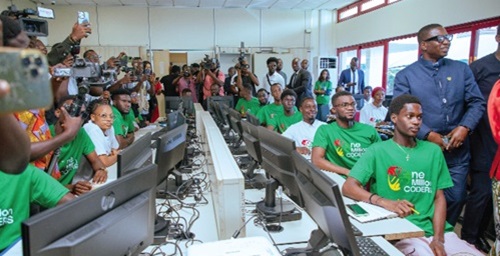President John Dramani Mahama yesterday launched Ghana’s ambitious One Million Coders Programme (OMCP), declaring it the foundation of a national technological transformation that will position the country as Africa’s digital leader.
The launch, held at the Ghana-India Kofi Annan Centre of Excellence in ICT, was greeted with overwhelming enthusiasm, with over 90,000 applications received within just 48 hours of the opening of the portal to receive applications, far surpassing initial expectations of around just 560 applications.
Digital empowerment
In a rousing keynote address, President Mahama framed the initiative as more than a training programme.
It is, he said, the bedrock of a new economic era.
"We are not just teaching code; we are rewriting Ghana’s future," the President said.
"This programme is our declaration to the world that Ghana will no longer be a consumer of technology but a creator; a nation where innovation drives growth, where our youth build solutions for our challenges, and where digital skills become the passport to prosperity," he added.
He drew parallels to global success stories, citing Estonia’s coding-integrated education system and India’s dominance in the $410 billion outsourcing market, emphasising that Ghana, with its strategic location and English-speaking workforce, was poised to become Africa’s premier tech hub.
President Mahama ended with a direct appeal to Ghana’s youth: "You are the architects of this digital dawn. Seize this opportunity, not just to learn but to lead."
Scaling up
The Minister of Communication, Digital Technology and Innovations, Samuel Nartey George, revealed the staggering demand of 91,847 applications as of launch day, forcing an immediate expansion from the planned 560 trainees to a much larger first cohort.
"This isn’t just a training programme; it’s a movement," Mr George declared.
"We’ve partnered with Google, Microsoft, Amazon Web Services, and MTN to ensure our curriculum is world-class. From cybersecurity to data analytics, we’re preparing Ghanaians not just for jobs but to create jobs," he said.
The programme’s modular training approach will be rolled out across Accra, Kumasi, Sunyani, and Bolgatanga, with plans to activate community information centres nationwide to ensure rural inclusion.
Economic transformation
The President and the minister underscored the One Million Coders Programme’s role in job creation, referencing the potential of tapping into global tech and outsourcing markets, and entrepreneurship to enable startups to solve local challenges in agriculture, health care and governance.
They also touched on the programme’s potential for education reform to embed coding in school curricula for long-term impact, and to foster inclusion that would prioritise women, rural youth and persons with disabilities.
First cohort
As the first cohort begins training next month, all eyes are on Ghana’s boldest bet yet on a tech-driven future.
In an interview with the Daily Graphic after the launch, Afia Sey (not her real name), an applicant, said the potential of the coders programme to transform the technology industry was huge.
She said her interest for the programme grew when she discovered that a course she had wanted to pursue but did not have the funds to finance was being offered for free as part of the programme.
“This course that I am signing up for cost a lot of dollars when I looked it up online, so although I wanted to pursue it, I couldn’t afford it, and moreover no institution in the country was offering it, and I had to do it online at a huge fee that I couldn’t afford,” she said.
Background
The Ghana Coders Programme, officially known as the “One Million Coders Programme”, is an ambitious national initiative aimed at equipping Ghana’s youth with critical digital skills to drive the country’s digital transformation, and position Ghana as a leader in Africa’s tech ecosystem.
The programme emerged as a key manifesto promise of the National Democratic Congress (NDC) during the 2024 election campaigns, and has been adopted as a flagship initiative by the administration of President Mahama.
It reflects Ghana’s recognition of digital skills as essential for employability, economic diversification and global competitiveness in the Fourth Industrial Revolution.
The government formally announced that the programme’s pilot phase would begin yesterday, April 16, 2025, initially targeting four regions, namely Greater Accra, Ashanti, Bono, and Upper East, with plans for nationwide expansion.

